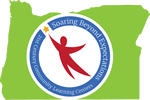TRI Hosts After-School Programs from Around Oregon
May 2, 2016
21st CCLC Spring Conference 2016:
Every Student Thriving
May 5, 2016 to May 6, 2016
 The Research Institute (TRI), in partnership with the Oregon Department of Education
(ODE), hosted the 21st Century Community Learning Centers (CCLC)
2016 Spring Conference at Western Oregon University on May 5th
and 6th.
The Research Institute (TRI), in partnership with the Oregon Department of Education
(ODE), hosted the 21st Century Community Learning Centers (CCLC)
2016 Spring Conference at Western Oregon University on May 5th
and 6th.
Oregon's 21st Century Community Learning Centers (21st CCLC), which provides out-of-school programs for students, serve 22 school districts and have 97 sites serving children and families. There are 55 sites serving elementary and K-8 students, 21 sites serving middle school students, and 21 sites serving high school students.
Every Student Thriving
The conference theme was "Every Student Thriving." Representatives from 22 school districts across Oregon attended this bi-annual conference at the Werner University Center, engaging in a variety of professional development activities, including Program Team Time, Peer-to-Peer Conversations, and both 1-hour and 2-hour Breakout Sessions on a variety of topics.
Keynote Speakers
On Thursday, Celeste Janssen, Director of the Institute for Youth
Success delivered a keynote address about the value of Developmental Relationships and offered a follow up breakout
session on social emotional learning.
Our Thursday evening Networking Social address and Friday keynote address was presented and performed by Alex Dang. He is a renowned Slam Poet who addressed student voice, cultural identity, and the importance of quality after-school experiences, positive adult mentors, and family engagement.
What are the 21st Century Community Learning Centers
The 21st Century Community Learning Centers (21st CCLC) initiative is the only federal funding source dedicated exclusively to before school, after school, and summer learning programs. Each state education agency receives funds based on its share of Title I funding for low-income students at high-poverty, low performing schools. Funds are also allocated to territories and the Bureau of Indian Affairs.
21st CCLC programs provide:
Academic enrichment activities that help students meet state and local achievement standards;
A broad array of additional services designed to reinforce and complement the regular academic program; and
Literacy and related educational development services to the families of children who are served in the program.
Click here for more information about the 21st CCLC.
To find social media posts about the conference, use the hashtag #OR21CCLC.
Recent News Items
21st CCLC New Program Director Session at COSA Aug 3, 2018
21st CCLC Orientation Modules Jan 5, 2017
Klamath Falls Extravaganza Jun 28, 2016
TRI Hosts After-School Programs from Around Oregon May 2, 2016
Senator Jeff Merkley Honors Falls City Program Feb 15, 2016



